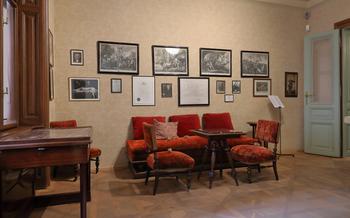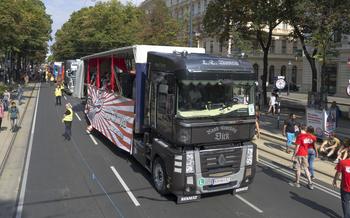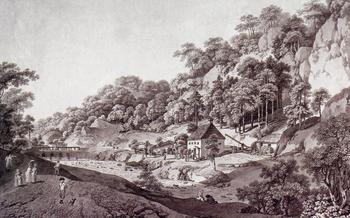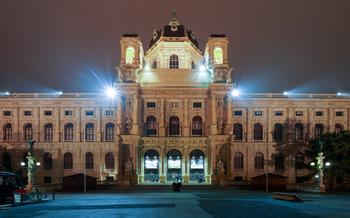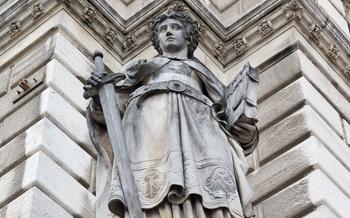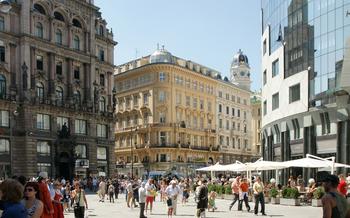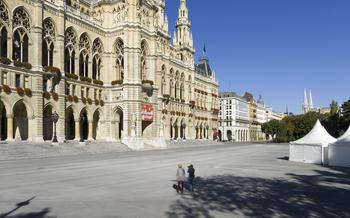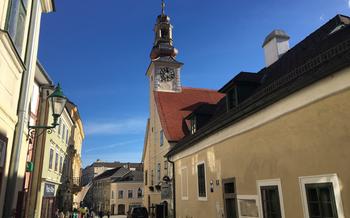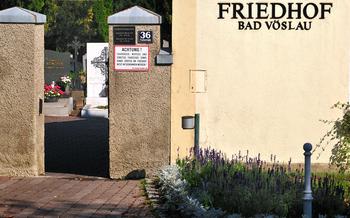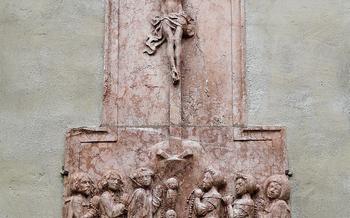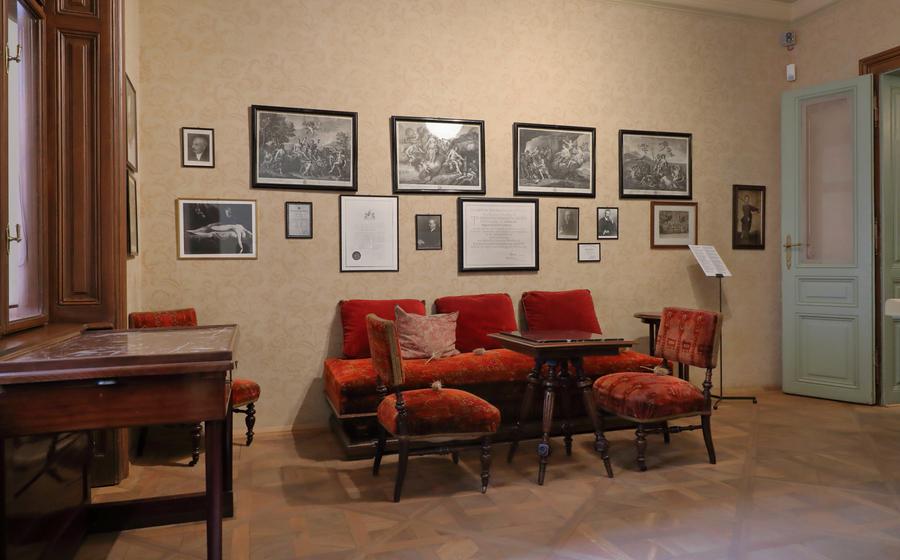
Sigmund Freud Museum
- Sigmund Freud Museum: A Journey into the Mind of a Genius
- Exploring Freud's Life and Work
- Interactive Experiences and Multimedia Exhibits
- Freud's Study and Consultation Room: A Sanctuary of Psychoanalysis
- Freud's Library and Collection of Antiquities
- Temporary Exhibitions and Special Events
- Guided Tours and Audio Guides
- Educational Programs and Workshops
- Research and Academic Collaborations
- Souvenir Shop and Museum Publications
- Accessibility and Facilities
- Hours of Operation and Admission Fees
- Location and Transportation
- Nearby Attractions and Points of Interest
- Insider Tip: Hidden Gems and Secret Corners
Sigmund Freud Museum: A Journey into the Mind of a Genius
Step into the world of psychoanalysis at the Sigmund Freud Museum in Vienna. Located in the heart of the city's historic district, this museum offers a captivating journey into the life and work of the founding father of psychoanalysis, Sigmund Freud. Once Freud's home and private practice, the museum now houses a treasure trove of artifacts, documents, and personal belongings that provide a unique glimpse into the mind of this groundbreaking thinker.
Easily accessible by public transportation, the museum is situated in the elegant Berggasse 1 Once inside, you'll be transported back in time to the early 20th century, where Freud's theories and ideas revolutionized our understanding of the human psyche. Get ready to explore the fascinating exhibits, immerse yourself in Freud's personal life, and unravel the secrets of the unconscious mind.
Exploring Freud's Life and Work
The Sigmund Freud Museum offers a fascinating journey into the life and work of one of the most influential thinkers of the 20th century. Visitors can gain insights into Freud's personal life, family relationships, and the development of his groundbreaking theories on psychoanalysis.
The museum showcases exhibits that delve into Freud's childhood, education, and early career as a neurologist. Personal artifacts, photographs, and letters provide a glimpse into his formative years and the influences that shaped his thinking.
A highlight of the museum is the exploration ofFreud's clinical work and case studies. Visitors can learn about his methods of psychoanalysis, the patients he treated, and the groundbreaking insights he gained into the human mind. Through interactive displays and multimedia presentations, the museum brings Freud's theories and clinical practice to life.
Interactive Experiences and Multimedia Exhibits
The Sigmund Freud Museum takes visitors on an immersive journey through Freud's life and work, using state-of-the-art technology and interactive displays. Digital installations and touchscreens allow visitors to explore Freud's theories, case studies, and personal writings in a dynamic and engaging way. Audiovisual presentations and multimedia storytelling bring Freud's world to life, providing insights into the development of psychoanalysis and its impact on our understanding of the human mind.
Hands-on activities and educational workshops offer visitors the opportunity to delve deeper into Freud's work and its relevance to contemporary life. Through interactive exercises and discussions, visitors can gain a deeper understanding of psychoanalysis and its applications in fields such as psychology, psychiatry, and psychotherapy. These interactive experiences make the museum a vibrant and engaging space, where visitors can actively participate in the exploration of Freud's legacy.
Freud's Study and Consultation Room: A Sanctuary of Psychoanalysis
Step into the heart of Freud's therapeutic practice as you enter his meticulously preserved study and consultation room. Original furnishings, personal belongings, and symbolic objects create an evocative atmosphere that transports visitors back in time. The room's design reflects Freud's theories and methods, with its eclectic mix of antique furniture, oriental carpets, and Egyptian artifacts.
Take a seat on Freud's iconic psychoanalytic couch, where countless patients shared their deepest thoughts and secrets. Examine the antique desk and bookcase, which hold personal photographs, books, and objects that offer glimpses into Freud's life and work. Discover the significance of the Egyptian scarab on his desk, symbolizing rebirth and transformation, and the Greek statue of Eros, representing the power of love and sexuality.
Through carefully curated displays and multimedia presentations, the museum brings Freud's therapeutic process to life. Learn about his techniques, such as free association and dream analysis, and gain insights into the complex dynamics of the human psyche. Explore case studies and clinical notes that showcase Freud's groundbreaking work with patients suffering from neuroses, anxieties, and other mental disorders.
The study and consultation room is a testament to Freud's dedication to understanding the complexities of the human mind. It is a place where visitors can delve into the origins of psychoanalysis and experience the profound impact of Freud's theories on our understanding of ourselves and the world around us.
Freud's Library and Collection of Antiquities
Freud was a voracious reader and collector, and his personal library and collection of antiquities offer a glimpse into his intellectual world and the development of psychoanalysis. The museum houses over 35,000 books, including rare editions of works by Freud and his contemporaries, as well as a vast collection of artifacts from ancient Egypt, Greece, and Rome.
Freud's library is a testament to his wide-ranging interests, encompassing philosophy, psychology, literature, and art. Visitors can browse the shelves and discover the books that shaped Freud's thinking, from the works of Goethe and Shakespeare to those of Charles Darwin and Wilhelm Wundt. The collection also includes Freud's personal annotations and marginalia, providing a unique insight into his thought process.
The museum's collection of antiquities, meanwhile, reflects Freud's fascination with the human psyche and the origins of civilization. Among the highlights are a collection of Egyptian statuettes, Greek vases, and Roman sculptures, as well as a number of archaeological artifacts from Freud's own excavations. These objects offer a tangible connection to the ancient cultures that Freud believed held clues to the human mind.
Exploring Freud's library and collection of antiquities is a journey through the mind of a genius, providing a deeper understanding of the man behind psychoanalysis and the intellectual influences that shaped his work.
Temporary Exhibitions and Special Events
The Sigmund Freud Museum regularly hosts temporary exhibitions and special events that delve deeper into various aspects of psychoanalysis and its cultural impact. These exhibitions showcase rare artifacts, explore specific themes, and present innovative perspectives on Freud's work. Visitors can expect to encounter thought-provoking displays, interactive installations, and multimedia presentations that shed new light on the history and legacy of psychoanalysis.
Special events, such as workshops, lectures, and film screenings, offer opportunities for in-depth discussions and learning. Experts in the field of psychoanalysis, scholars, and clinicians share their insights, engage in dialogues with visitors, and provide unique perspectives on Freud's theories and their contemporary relevance. These events create a dynamic and engaging environment where visitors can expand their knowledge and understanding of psychoanalysis in a collaborative and interactive setting.
Guided Tours and Audio Guides
Enhance your experience at the Sigmund Freud Museum with guided tours and audio guides that provide expert insights and historical anecdotes. Professional guides offer a wealth of knowledge about Freud's life, work, and the development of psychoanalysis. They will take you through the museum's exhibits, explaining the significance of artifacts and offering personal stories about Freud and his patients.
For a more independent exploration, choose the self-guided audio tour available in multiple languages. Listen to engaging commentaries as you wander through the museum at your own pace. The audio guides provide detailed information about Freud's theories, case studies, and the history of psychoanalysis.
Whether you prefer a guided tour or an audio guide, you'll gain a deeper understanding of Freud's work and its impact on modern psychology. Group tours can be customized to suit specific interests, while individual visitors can benefit from personalized recommendations from the museum staff.
Educational Programs and Workshops
The Sigmund Freud Museum offers a range of educational programs and workshops that delve deeper into the theories and practices of psychoanalysis. These programs are designed for individuals seeking personal and professional development, as well as mental health professionals looking to enhance their skills and knowledge.
Courses, Seminars, and Workshops:
-
Introductory Courses: Comprehensive overviews of psychoanalysis, its history, key concepts, and applications.
-
Advanced Seminars: In-depth exploration of specific psychoanalytic topics, such as dream analysis, defense mechanisms, and psychopathology.
-
Clinical Workshops: Hands-on training in psychoanalytic techniques, case studies, and therapeutic interventions.
-
Personal Development Workshops: Workshops focused on self-awareness, emotional intelligence, and personal growth through the lens of psychoanalysis.
Training Programs for Mental Health Professionals:
-
Psychoanalytic Psychotherapy Training: Comprehensive training program for mental health professionals seeking to become psychoanalytic psychotherapists.
-
Supervision and Consultation: Individual and group supervision for psychotherapists seeking guidance and support in their clinical work.
-
Continuing Education Workshops: Workshops and seminars on specialized topics relevant to mental health professionals.
These educational programs and workshops provide participants with a unique opportunity to learn from leading experts in the field of psychoanalysis, engage in discussions with fellow learners, and gain practical skills for personal and professional growth.
Research and Academic Collaborations
The Sigmund Freud Museum has established extensive collaborations with universities and research institutions worldwide, fostering ongoing scholarly inquiry and academic exchange. Researchers and scholars have access to Freud's original writings, research materials, and personal library, providing invaluable resources for their studies. The museum also hosts conferences, workshops, and seminars, bringing together experts in psychoanalysis, psychology, and related fields to share knowledge and engage in discussions. These collaborations not only contribute to the preservation and dissemination of Freud's legacy but also stimulate new research and theoretical developments in the field of psychoanalysis.
Souvenir Shop and Museum Publications
The Sigmund Freud Museum offers a diverse array of souvenirs and publications that cater to the interests of both casual visitors and ardent enthusiasts of psychoanalysis. The museum shop is a treasure trove of books, merchandise, and souvenirs that allow visitors to take a piece of Freud's legacy home with them.
Books on psychoanalysis, Freud's theories, and the history of the field are available for purchase, providing visitors with an opportunity to delve deeper into the complexities of the human mind. Museum publications, including journals, research papers, and catalogs, offer scholarly insights into Freud's work and the latest developments in psychoanalysis.
These publications serve as valuable resources for researchers, mental health professionals, and anyone seeking a deeper understanding of Freud's contributions to the field. By preserving and disseminating Freud's legacy through its publications, the museum ensures that his groundbreaking ideas continue to inspire and inform future generations.
Accessibility and Facilities
The Sigmund Freud Museum welcomes visitors from all backgrounds and abilities. Accessibility features such as ramps, elevators, and accessible restrooms ensure that everyone can enjoy the museum's exhibits and programs. Guided tours in sign language and braille are available upon request, allowing visitors with hearing or visual impairments to fully participate in the museum experience. For added convenience, the museum provides a cloakroom for storing personal belongings, restrooms on every floor, and a café where visitors can relax and refresh.
Hours of Operation and Admission Fees
The Sigmund Freud Museum is open to visitors from Tuesday to Sunday, with varying hours of operation depending on the season. During the summer months (April to October), the museum is open from 10 am to 6 pm, while in the winter months (November to March), it is open from 10 am to 5 pm.
Admission fees are currently set at €12 for adults, €9 for students and seniors, and €6 for children between the ages of 6 and 1Family tickets are also available for €25, admitting two adults and two children. Visitors can purchase tickets online or at the museum's ticket counter.
For those interested in a more immersive experience, guided tours are offered in English and German for an additional fee. These tours typically last for 60 to 75 minutes and provide visitors with a deeper understanding of Freud's life, work, and the history of the museum.
Location and Transportation
The Sigmund Freud Museum is conveniently located in the heart of Vienna, at Berggasse 1It is easily accessible by public transportation, with the nearest underground station being Schottentor (lines U2 and U4). Alternatively, visitors can take tram lines 37 or 43 to the Sigmund-Freud-Park stop. For those arriving by car, there are several parking garages in the vicinity, including the Freyung Garage and the Am Hof Garage.
Once you arrive in the museum's neighborhood, take a moment to soak in the vibrant atmosphere. Berggasse is a charming street lined with historic buildings, cafés, and boutiques. It is also home to the Sigmund Freud Park, a tranquil green space where you can relax and reflect on your visit to the museum.
Nearby Attractions and Points of Interest
The Sigmund Freud Museum is located in the heart of Vienna, surrounded by a wealth of cultural attractions and historical landmarks. Take advantage of your visit to explore the vibrant neighborhood and discover hidden gems. Stroll along the picturesque Berggasse, where Freud lived and worked for many years, and admire the beautiful architecture of the surrounding buildings.
Within walking distance, you'll find the Votivkirche, a stunning neo-Gothic church known for its intricate stained glass windows and towering spires. For art enthusiasts, the Leopold Museum, just a short walk away, houses an impressive collection of Austrian art, including masterpieces by Gustav Klimt and Egon Schiele.
For a taste of Viennese culture, indulge in a traditional Viennese coffeehouse experience at Café Central, renowned for its elegant ambiance and delicious pastries. If you're looking for a unique souvenir, visit the Sigmund Freud Bookshop, located in the museum, where you can find a wide range of books and merchandise related to psychoanalysis and Freud's life and work.
To make the most of your time in Vienna, consider purchasing the Vienna Pass, which offers free or discounted admission to over 60 top attractions, including the Sigmund Freud Museum. This pass allows you to explore the city's rich cultural heritage and save money at the same time.
Insider Tip: Hidden Gems and Secret Corners
Beyond the main exhibits, the Sigmund Freud Museum holds many hidden gems and secret corners waiting to be discovered by curious visitors. Take the time to explore the museum's nooks and crannies, and you might stumble upon fascinating artifacts, forgotten stories, and unique perspectives on Freud's life and work.
One hidden gem is the museum's rooftop terrace, which offers panoramic views of Vienna's historic cityscape. From this vantage point, you can appreciate the city's architectural heritage and the vibrant atmosphere of the surrounding neighborhood. The terrace is a perfect spot to take a break, reflect on your museum experience, and soak in the beauty of Vienna.
Another secret corner worth exploring is Freud's private library, which contains over 3,000 books on various subjects, including psychoanalysis, philosophy, literature, and art. This collection reflects Freud's wide-ranging intellectual interests and his insatiable curiosity. Browsing through the books and examining their annotations offers a glimpse into Freud's thought process and the evolution of his ideas.
To make the most of your visit, consider attending one of the museum's special events or workshops. These events provide an opportunity to engage with experts in the field of psychoanalysis, learn about cutting-edge research, and participate in discussions on various topics related to Freud's work. Keep an eye on the museum's website for upcoming events and workshops that align with your interests.
